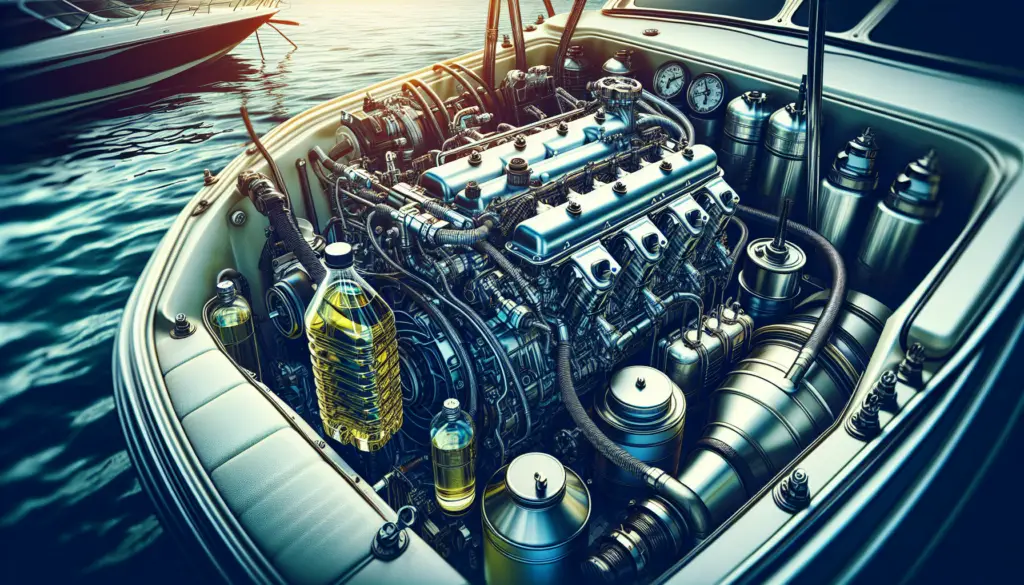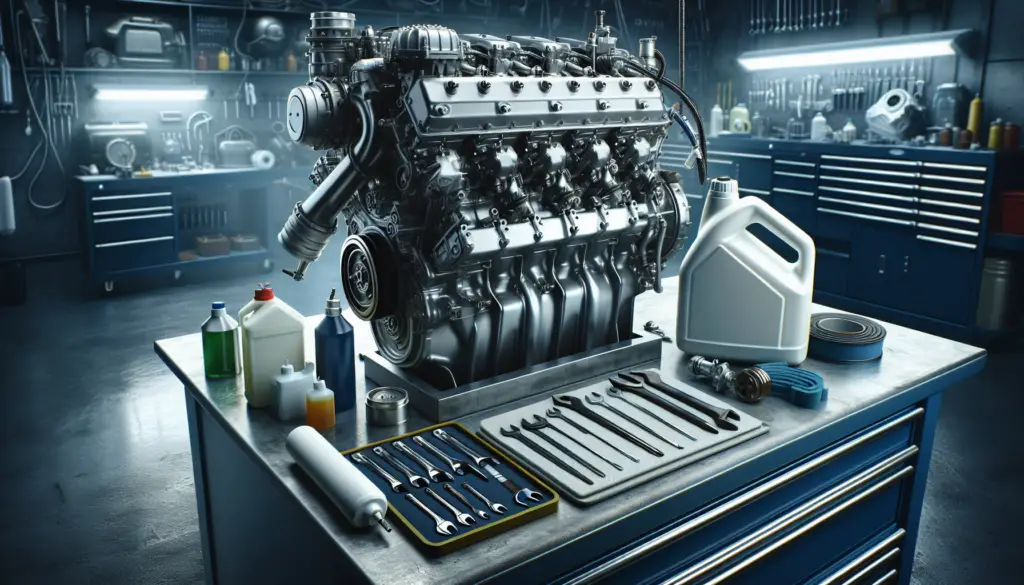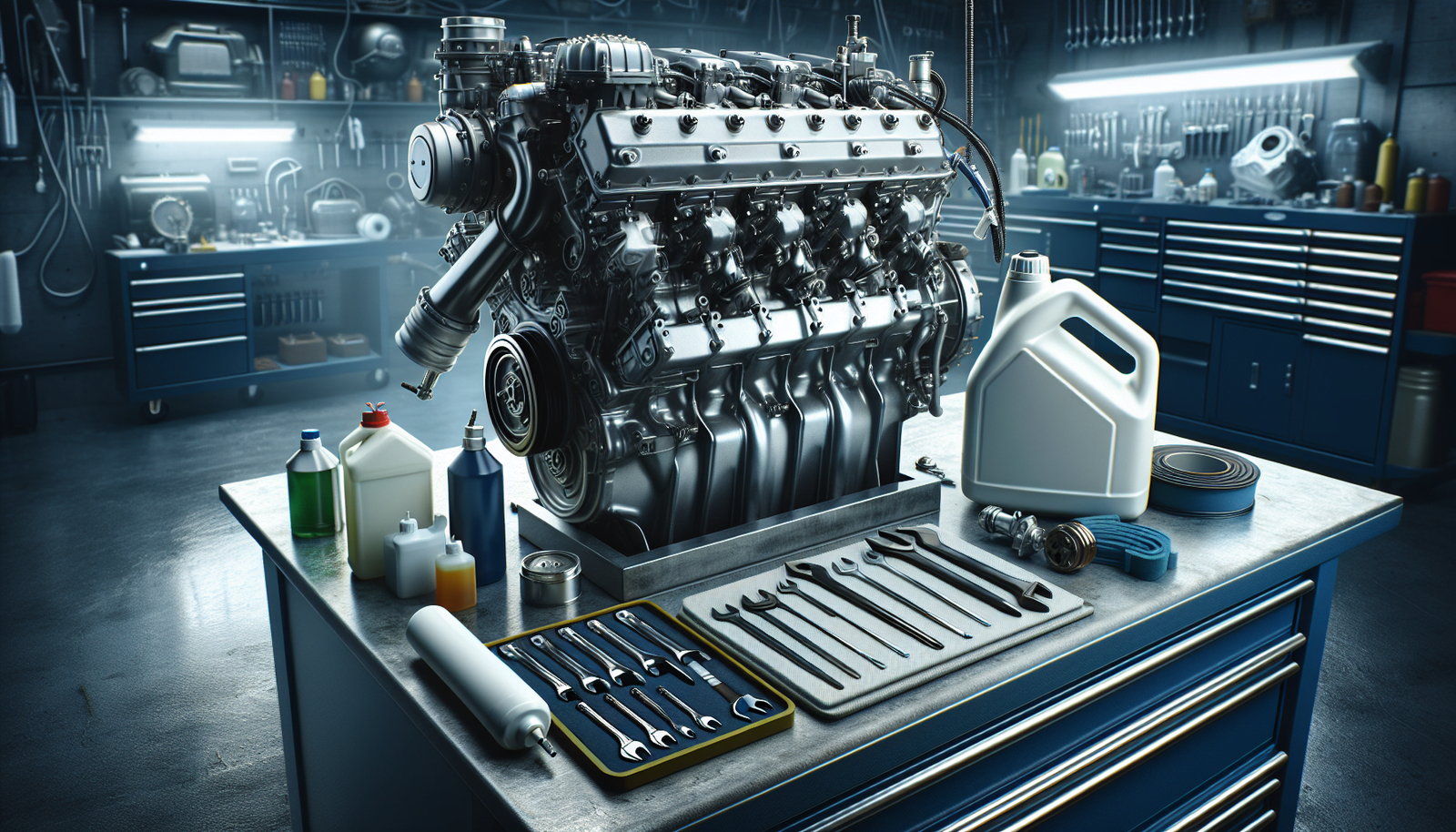Navigating the route toward excellent boat engine care doesn’t have to be as tricky as plotting a course on the open water. In the article “Boat Engine Maintenance: What You Need to Know”, you’ll discover the various facets of maintaining your boat’s engine. From basic general upkeep strategies to thorough, step-by-step procedures for intricate preventative measures, this guide has you covered. You’ll not only equip yourself with the knowledge to keep your boat running smoothly, but you’ll also learn to spot potential issues before they run your seafaring adventures aground.

Understanding Your Boat Engine
Just like any automobile, your boat consists of various mechanical parts that rely on each other to perform at their peak. One of the most critical components is the boat engine. This engine is the heart of your vessel, and understanding its operation is critical for smooth sailing.
Basics of How a Boat Engine Works
A boat engine operates similarly to a car engine. It is an internal combustion engine that burns fuel inside the engine in cylinders. The burning of the fuel creates pressure, which forces the pistons to move. The pistons’ movement is transferred to the propeller, making your boat move. It’s essential to understand the basics of your boat’s engine as it allows you to better sense when something is going wrong and helps guide your maintenance practices.
Differences between Inboard and Outboard Motors
There are two primary types of boat engines: inboard and outboard motors. An inboard motor is located inside the boat’s hull, while an outboard motor is mounted outside the boat on the stern. Inboard motors offer better balance and stability, making them suitable for larger boats. On the other hand, outboard motors are more versatile and easier to maintain, making them popular for small to mid-sized boats.
Importance of Regular Maintenance
Regular maintenance is the key to your boat engine’s longevity and performance. It helps you identify problems early, prevent major failures, and keep the engine running efficiently. By maintaining your engine routinely, you save money on expensive repairs and reduce the chances of being stranded on the water due to mechanical issues.
Routine Inspections for Boat Engines
Performing regular inspections is an integral part of boat engine maintenance. These inspections help you catch minor issues before they escalate into significant problems.
Checking for Leaks and Cracks
Inspect your engine regularly for leaks and cracks. Look for oil or coolant leaks as these could indicate problems with gaskets or seals. Also, make sure to check the engine block, hoses, and connections for any cracks.
Examining the Fuel System
A regular examination of the fuel system is necessary. Ensure that there are no leaks or damage to the fuel hoses and connections. Your fuel tank should also be clean, free from rust, and properly sealed. A problematic fuel system can lead to poor engine performance and possible hazards.
Assessing the Belt and Hoses
Check the engine’s belts and hoses for any signs of damage, wear, or slackness. Damaged belts and hoses can affect the operation of the engine’s alternator, water pump, and other crucial parts.
Looking for Corrosion and Rust
Corrosion and rust are common problems in boat engines due to the marine environment. Regularly inspect the engine’s battery terminals, connections, and other metallic parts for any signs of corrosion or rust.
Verifying the Propeller Condition
Finally, examine the propeller for any signs of damage. A damaged propeller can affect your boat’s performance and fuel efficiency.
Dealing with Engine Oil
The engine oil plays a fundamental role in the operation of your boat’s engine. It lubricates the engine’s parts, reducing friction and preventing overheating.
Understanding the Role of Engine Oil
Engine oil lubricates the internal components of your boat engine, reducing friction between parts and preventing excessive heat build-up. It also helps in cleaning the engine by picking up dirt and debris.
When and How to Change Boat Engine Oil
You should change your boat engine oil based on the manufacturer’s recommendations, typically after a certain number of hours of operation or at least once a year. To change the oil, drain the old oil, replace the oil filter, and add new oil.
Choosing the Right Engine Oil
The right engine oil depends on your engine’s type and age. Always refer to your manufacturer’s specifications when choosing engine oil. Synthetic oil is typically recommended for newer engines, while older engines may require conventional oil.

Maintaining the Cooling System
The cooling system plays a significant role in your boat engine performance. It helps maintain the engine’s temperature by circulating coolant around the engine block.
Importance of a Healthy Cooling System
A healthy cooling system prevents your boat engine from overheating and potential damage. Overheating can lead to engine failure, leading to costly repairs and possible safety issues.
Spotting and Addressing Overheating Issues
Regularly monitor your engine’s temperature and look for signs of overheating. This could include reduced engine performance, steam or smoke from the engine area, or an unusually hot engine. If you notice any signs of overheating, it’s crucial to resolve the issue immediately by servicing the cooling system.
Changing and Maintaining Coolant Levels
The coolant in your boat engine should be periodically changed based on the manufacturer’s guidelines. Maintaining the correct coolant level is also crucial. If the liquid is too low, it may not sufficiently cool the engine, leading to overheating.
Maintaining the Fuel System
The fuel system supplies the required fuel for the engine to operate. Keeping it clean and efficient is crucial for overall engine performance.
Understanding the Importance of a Clean Fuel System
A clean fuel system ensures that the engine receives a steady, clean supply of fuel. It helps in maintaining optimum engine performance, fuel economy, and reduces emissions.
Addressing Common Fuel System Problems
Common fuel system problems include clogged fuel lines or filters, water in the fuel, or damaged fuel injectors. Regular inspections and maintenance can help identify and address these issues.
Replacing Fuel Filters
Fuel filters help keep the fuel clean by trapping dirt and debris. With time, they can become clogged and need replacement. Replace your fuel filters regularly according to your manufacturer’s recommendations.
Maintaining Fuel Lines
Inspect your fuel lines regularly to ensure they are not cracked or leaking. Replace any damaged lines immediately to prevent fuel leaks and potential hazards.
Proper Battery Care
The boat battery supplies power to start the engine and run the boat’s electronics. Proper care and maintenance can extend its life and ensure reliable performance.
Proper Boat Battery Installation
A properly installed boat battery ensures optimal performance and safety. Ensure the battery is securely fastened, the terminals are clean and tight, and the cables are properly connected.
Regular Battery Inspections and Cleaning
Inspect the battery regularly for any signs of damage or leakage. Additionally, cleaning the battery terminals can prevent corrosion and ensure a solid connection.
Choosing and Maintaining the Correct Battery Type
Choose the right battery type based on your boat’s electrical needs. Regular maintenance, including charging and topping up the electrolyte levels (for lead-acid batteries), is necessary for extending battery life.
Maintaining the Exhaust System
The exhaust system helps remove exhaust gases from the engine and reduce noise levels.
Understanding the Role of the Exhaust System
The exhaust system plays a pivotal role in engine efficiency and safety. It evacuates exhaust gases, reduces engine noise, and helps maintain optimum fuel efficiency.
Performing Regular Exhaust System Check-up
Regular checks can help detect issues in the exhaust system before they escalate. Look for signs of black soot, leaks, or a louder than normal engine noise, which could indicate problems.
Dealing with Common Exhaust Issues
Common problems with the exhaust system may include leaks, blockages, or a faulty muffler. Immediate attention to these issues can prevent serious engine damage and safety risks.
Maintenance during Off-Season
During the off-season, boats require specific maintenance procedures to prevent damage and ensure they are ready to go when the season arrives.
Proper Storage of Boat for Winter
During winter, it’s crucial to store your boat properly. Protect it from the elements by storing it in a covered area or using a boat cover. Additionally, make sure to clean it thoroughly and remove any water from the bilge.
Winterising Your Boat Engine
Winterizing your boat engine involves draining the water from the engine, adding coolant, and lubricating the engine parts to protect them from rust and corrosion.
Prepping Your Boat Engine for the Boating Season
As the boating season approaches, prep your engine by checking the oil and coolant levels, inspecting the belts and hoses, and running the engine to ensure it’s operating smoothly.
Maintenance Tools and Supplies
Having the right tools and supplies can make maintenance tasks easier and more efficient.
Stocking the Essential Maintenance Tools
Stock the essential maintenance tools such as wrench sets, screwdrivers, pliers, a flashlight, and a multimeter. Other necessary items include oil filters, spare belts, and various engine fluids.
Importance of High Quality Supplies
Using high-quality supplies and parts ensures the best performance and longevity of your boat engine. Low-quality supplies may not perform as well and could potentially lead to more significant issues down the line.
Knowing When to Seek Professional Help
While regular maintenance can be done by yourself, some complex repairs require professional help. Don’t hesitate to consult a professional when you notice significant issues with your engine.
Preventive Measures and Regular Checks
Adopting preventive measures and conducting regular checks can save you time, money, and potentially dangerous situations.
Creating a Regular Maintenance Schedule
A regular maintenance schedule helps keep track of all the necessary tasks and when to perform them. This includes routine inspections, oil changes, filter replacements, and more.
Managing Minor Repairs Before They Become Major
Addressing minor issues promptly can often prevent them from becoming major problems. Don’t ignore slight changes in your boat’s performance, as they could be signalling an emerging issue.
Importance of Regular Engine Run-ups
Performing engine run-ups regularly ensures the moving parts maintain their freedom of movement, thereby preventing “dry starts” that can wear down the engine over time.
Keeping a Maintenance Log
Keeping a maintenance log is a good practice. A log can help track maintenance tasks, fuel consumption, and other information. It can also reveal patterns or recurring problems that need attention.
In conclusion, understanding and maintaining your boat engine is critical for safe, efficient, and enjoyable boating. Regular checks, preventive measures, and using high-quality maintenance supplies can keep your boat engine in top form and save on costly repairs. Happy boating!

